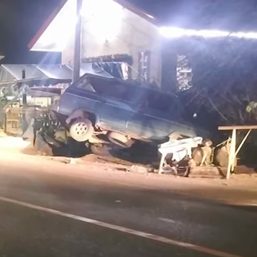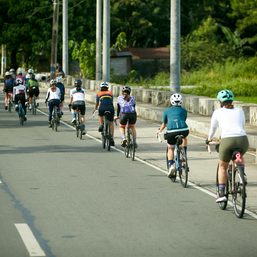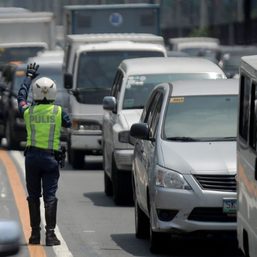SUMMARY
This is AI generated summarization, which may have errors. For context, always refer to the full article.
![[OPINION] Steps the Philippines can immediately take to reduce road casualties](https://www.rappler.com/tachyon/2024/05/Steps-the-Philippines-can-immediately-take-to-reduce-road-casualties.jpg)
I’m executive chairman of the UK-registered charity the Safer Roads Foundation (SRF), a science-based, not-for-profit organization actively working around the world to reduce road casualties. In visiting Manila over the last two years, what struck me was the charm and warmth of its people, but also the opportunity to dramatically reduce the carnage which occurs every day on the country’s roads.
There are two low-hanging fruits, which should be harvested now to achieve this objective.
Automatic headlights on for motorcycles, scooters
Statistics tell us that the most vulnerable road users are motorcyclists and scooter riders, and that many accidents are due directly to other drivers simply failing to see them as their narrow visual profile is so much weaker than other vehicles.
The scientific research evidence is compelling that motorcyclists and scooter riders are considerably safer when riding with their headlights on during daytime. The European Commission was convinced of the value of automatic headlines on (AHO) and legislated in 2016 that all new models of powered two-wheelers (PTWs) sold in the European Union, no matter where they are manufactured around the world, have to incorporate the AHO safety feature. The effect is that the bike’s headlight is immediately illuminated when the ignition is switched on.
While many riders in the Philippines already use their headlights during the daytime, large numbers don’t. Therefore, it would be an opportune moment to legislate that the feature is incorporated during manufacture. This would follow other Southeast Asian countries, which, for many years, have made AHO a statutory requirement for all powered two-wheelers. They include Malaysia (1992), Singapore (1995), Indonesia (2009), Thailand (2011), and India (2017).
The essential point is that, research demonstrates that AHO dramatically reduces casualties between 15% and 20%, which is startling considering there is no cost to introduce the feature in manufacture. Ironically, AHO can actually produce savings for companies as they do not need to differentiate between models when exporting to jurisdictions which insist upon the feature. It’s telling that riders don’t normally object to AHO as there is no disadvantage, and they simply turn on the engine and go.
If it’s the right thing to do to protect the lives of PTW riders almost everywhere else in the world, then the question has to be asked: Why can’t the Philippine government equally legislate this lifesaving feature? As AHO has become almost universal, if other countries can mandate the measure, there is no rational excuse for the Philippines not to do likewise – it just needs the political will to do so.
Anti-lock braking system for motorcycles, scooters
The number of lives lost from motorcycle and scooter accidents is profoundly disturbing, and the need for effective and immediate action is overwhelming.
There are many motorcycle models, but the most popular are the small-engine capacity machines with design speeds of 50kph or more. Statistics indicate that these motorcycle types dominate market share, and it’s these smaller engine machines which need to have anti-lock breaking system (ABS) fitted if large numbers of lives are to be saved.
An ABS is a safety mechanism that prevents the wheels from locking while the vehicle is in motion. For motorcycles, this can be fitted, as a minimum, via a single channel ABS to the front wheel of a motorcycle or scooter. The system ensures the rider has control of the motorcycle because, when braking, the wheels continue to rotate and the bike can move in whatever direction the driver is steering. Research has shown that PTWs fitted with ABS increases rider stability, reduces stopping distances, and decreases rider fatalities by a staggering 31%.
ABS should not be confused with a combined braking system or CBS, which does not prevent the wheels from locking. In emergency braking, CBS performs no better than a standard machine with no ABS.
There is a cost for ABS of approximately USD$40 fitted to the front wheel only, but considering it reduces PTW accidents by a third, it is an immensely modest amount. Manufacturers are often resistant to acting unilaterally, particularly in developing countries, because of the small additional cost, but aside from the lives saved by ABS, the economic benefits to society are huge.
Action needs to be taken without delay, because if fitted during manufacture, ABS would save 40,000 lives in Southeast Asia alone in the first five years following its introduction. A significant number of these lives would be in the Philippines, given its population of over 117 million people (2023).
Over a decade, ABS fitted to all PTWs would save an estimated 15,000 lives in the Philippines, equivalent to 30 fully-loaded A380s (three-class configuration), which is shocking and should motivate everyone in the country to do everything humanly possible to get action taken now. Arguably, accident statistics are underreported in the Philippines, so the figure could be even higher.
I sometimes literally have trouble sleeping when the world works in the way it does as we know how simple it would be to prevent misery. If the numbers involved are related to multiple fully-loaded A380s crashing, then people would immediately react, but they need catalysts and evangelists in each country to do something.
Working with our local partner organization in the Philippines, the Move As One Coalition, we would like to meet with the responsible policy makers and legislators to share experience. Safer Roads Foundation works closely with the Towards Zero Foundation and the Malaysian Institute of Road Safety Research, and look forward to establishing a constructive dialogue, sharing best practice from across Southeast Asia and the world.
What could be more important than saving lives on such an immense scale? And this would be achieved by introducing the regulation in the Philippines to mandate AHO on all machines and the fitment of ABS in manufacture for PTWS over 50cc. – Rappler.com
Michael Woodford, MBE, is the executive chairman of Safer Roads Foundation, a London-based not-for-profit organization dedicated to the reduction of road casualties across the world.
Add a comment
How does this make you feel?






There are no comments yet. Add your comment to start the conversation.